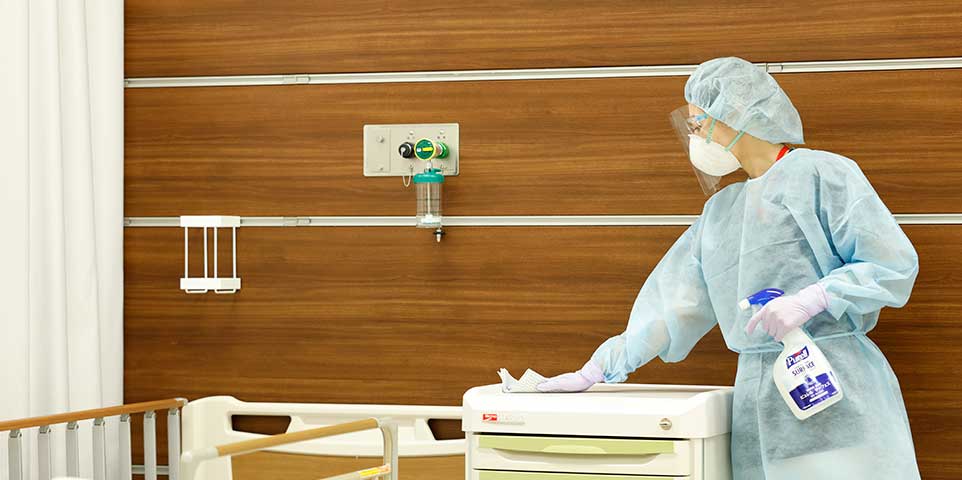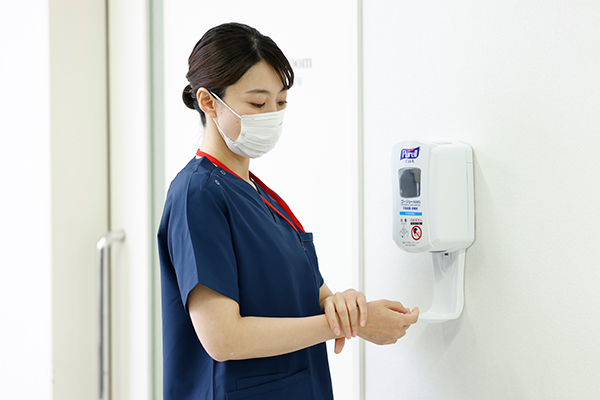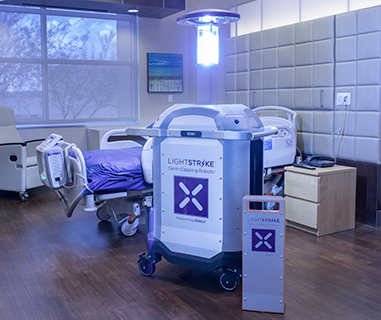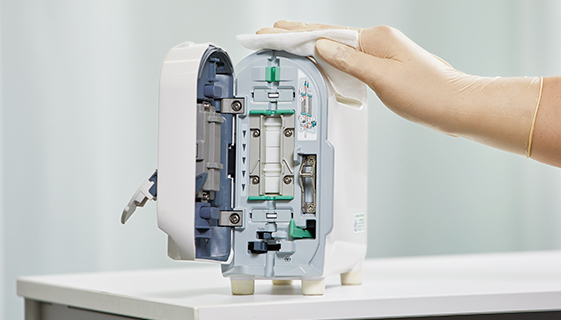 Top
Top
In Japan, infection control has long been a priority in medical settings. Every healthcare institution has considered how to manage the risks of infection inherent to various situations and has implemented measures to control these risks. There is a wide range of complex challenges that need to be addressed in order to properly implement infection control in hospitals. These include zoning, the flow of movement in the hospital, the resource allocation framework for receiving patients, and the enforcement of rules related to infection prevention and maintenance of the hospital environment.
However, with the recent spread of novel coronavirus disease (COVID-19), the risk of infection has grown into an issue that can potentially alter the functions and management of medical institutions, if not dealt with more quickly and with greater precision. The pandemic has brought more attention to infection control measures than ever before. In order to help with the implementation of these measures, Terumo has launched an Infection Control Initiative led by the General Hospital Company. We are focusing on proposing comprehensive solutions that address all stages of infection control, including the identification of issues, implementation, and follow-up support. The following are some of our efforts through this initiative.
Contributing to the thorough enforcement of hand hygiene and other standard precautions
Basic and universal infection control measures are necessary for hospitals to maintain their functions. Standard Precautions are said to be the most important of these measures. Standard Precautions are fundamental infection control measures that have been used for all patients, their families, and healthcare professionals since pre-pandemic times. These precautions dictate the handling of patients’ bodily fluids, excretions, wounded skin, and mucous membranes as potential substances of infection. The recent spread of COVID-19 has prompted healthcare institutions to reiterate the importance of these Standard Precautions. Hand hygiene is one of the most important measures to reduce the spread of infectious pathogens. Despite this, it has not been easy to ensure that everyone is aware of hand hygiene practices and is performing them consistently in busy medical settings. In addition to providing hand sanitizers and other products that contribute to hand hygiene, Terumo is working with healthcare professionals who are responsible for promoting infection control to identify issues within hospitals, devise educational strategies, and provide training to ensure thorough implementation of these measures.

Reinforcing the hygiene environment of medical settings
The novel coronavirus (SARS-CoV-2) is said to survive for several days on surfaces such as doorknobs and bed rails that have been touched by infected people. For this reason, all possible contact surfaces in hospital rooms used by infected people must be cleaned and disinfected. At institutions that receive infected patients, healthcare professionals spend several hours wiping surfaces. This has increased the mental and physical burden that they experience on the job. In order to reduce this burden and create effectual environments, Terumo provides cleaning cloths that can be easily used on a variety of surfaces and mercury-free UV irradiation robots. We also propose training programs and support the creation of standard operating protocols for more efficient and effective use of such tools.


Supporting quality, efficiency, and reduced contact in the ICU and other areas
In the ICU and other hospital rooms where critically ill COVID-19 patients are treated, healthcare professionals administer drugs to patients and suction their sputum continuously, which puts them at risk of infection. Terumo supports these professionals by supplying the infusion pumps and syringe pumps used in these settings. We are also designing operations that reduce the number of times they are required to enter hospital rooms through the use of a system that remotely monitors the operational status of the devices.

Providing a wealth of information to support infection control
To address the challenge of "raising awareness of infection control measures in hospitals," Terumo has established a new page on our website targeted at healthcare professionals that provides information on infection control measures. At the same time, we have also begun sharing information through our email newsletter. We provide a variety of information to support infection control in hospitals, including useful video content, tips for improving compliance with hand hygiene practices (the foundation of infection control), and methods for disinfecting and cleaning equipment.

Making the most of our infection control experience throughout the history
Throughout our history, Terumo has provided solutions for the prevention of infectious diseases, beginning with thermometers (our company’s first product) and the launch of Japan’s first single-use plastic syringe, to the introduction of plastic bags to replace the glass bottles used to store blood for transfusion. In recent years, we have been developing technologies (closed structures) to reduce the risk of infection posed by connectors for infusion lines and other devices used to administer IV drips. We have also been offering products to improve operating room and hospital room environments. Through these and other efforts, we have taken on the various issues faced by medical settings over the decades and worked to solve these issues together with the healthcare community, so that care can be provided safely and with peace of mind.
Simply introducing specific products to healthcare institutions will not guarantee that infection control is properly performed. Instead, a comprehensive approach is being taken by combining various measures, such as ensuring that products are used properly and operated effectively, while establishing and enforcing hospital rules. Terumo will continue to follow hospital needs closely while delivering essential solutions for medical settings in order to support care that is safe for patients and healthcare professionals alike.
